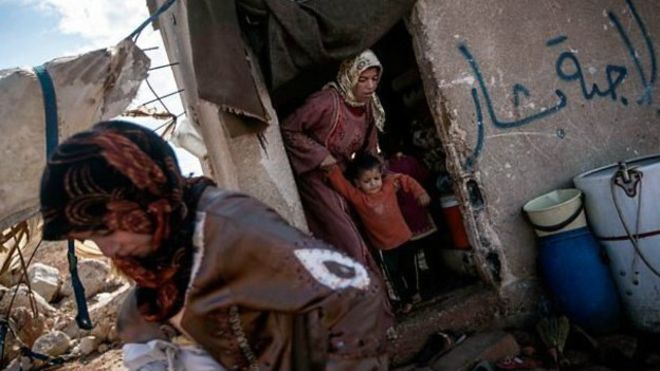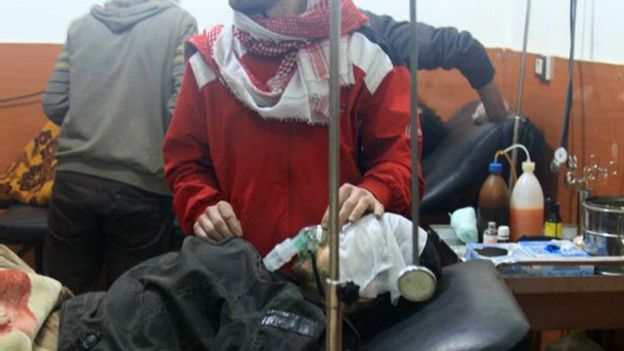The BBC has won a case against Russian TV channel RT, which claimed the corporation faked a report on Syria.

The station said the BBC had “staged” a chemical weapons attack for a news report, and digitally altered the words spoken by an interviewee.
The BBC complained to Ofcom, saying the “incredibly serious” allegations struck “at the heart” of its obligations to accuracy and impartiality.
Ofcom ruled that elements of the programme were “materially misleading”.
It also said the BBC had been treated “unfairly” by programme, called The Truthseeker, as it was not given a opportunity to address the allegations before the programme was broadcast.
Separately, Ofcom said another episode of The Truthseeker was guilty of a further “serious breach” of the broadcasting code.
The episode, titled Genocide of Eastern Ukraine, contained claims that the Ukrainian government was deliberately bombing civilians in the east of the country, had murdered and tortured journalists and carried out other acts such as crucifying babies.
Ukrainian army forces were accused of “ethnic cleansing” and were compared to the Nazis in World War Two.
The programme had “little or no counterbalance or objectivity”, Ofcom ruled.
The only response to the allegations in the broadcast was in the form of a caption saying “Kiev claims it is not committing genocide, denies casualty reports”, which appeared on screen for six seconds.

Ofcom said viewers expected the programme to tackle controversial global events from a Russian perspective – but that it had broken a rule designed to ensure impartiality in coverage of controversial political subjects.
TV Novosti cancelled The Truthseeker and removed all previous episodes from its website as a result of the complaints, Ofcom noted.
‘Misleading’
The allegations about the BBC were contained in a 13-minute episode entitled The Truthseeker: Media “staged” Syria Chem Attack.
Broadcast in March 2014, it opened with footage of wounded people lying on the floor of a room, while the presenter said: “The British Broadcasting Corporation is accused of staging [a] chemical weapons attack.”
Shortly afterwards, the presenter said: “August 2013 and Nato leaders can’t get the public onside for the imminent bombing of Syria. Suddenly the BBC says it was filming a small rural hospital, and a game-changing atrocity happens right there the moment they were filming.”
The programme went on to allege that the BBC altered an interview with a doctor, replacing the word “napalm” with the phrase “chemical weapon”.
And it claimed that the BBC’s report, by journalist Ian Pannell, had resulted in “a massive public investigation which made some extremely disturbing findings”.
Ofcom said the public investigation was in fact three letters of complaint to the BBC by Robert Stuart, alleging that several news reports from Syria had featured faked footage.
According to RT, Mr Stuart’s allegations remained “unanswered” by the BBC – but the corporation told Ofcom that his complaints had been “denied and rejected with detailed reasons” before The Truthseeker was broadcast.
In its response to Ofcom, TV Novosti, which owns and operates RT, said: “Mr Stuart’s investigation might fairly be described as massive” but it accepted that “the description of Mr Stuart’s complaint might have been misleading”.
It maintained that the BBC’s footage “clearly was faked”, adding that “any damage to the reputation and good name of the BBC [was] self-inflicted”.
Regarding the accuracy of the BBC’s reports, Ofcom said it was “not possible or appropriate” for the regulator “to attempt to prove or disprove the allegations made about the BBC”. The BBC’s Editorial Complaints Unit found there were no grounds to uphold any aspects of Mr Stuart’s complaint.
Instead, Ofcom said its role was to rule on whether any elements of RT’s programme were materially misleading.
‘Shocked’
Ofcom said that the description of Mr Stuart’s complaint as a “massive public investigation” had the effect “of elevating the various opinions expressed… to the firm conclusions of a significant and detailed official investigation”.
It ruled: “We did not consider that viewers would have clearly understood that the ‘massive public investigation’… was a complaint by a member of the public to the BBC which had been responded to in detail by the BBC and that it was also based on a number of online articles detailing individuals’ opinions.”
RT has been directed to broadcast a summary of Ofcom’s decision that its programme was misleading.
In response to the ruling, the BBC said: “We welcome this decision not only on behalf of the BBC but of the victims of the attack we reported and the brave medics who struggled to save their lives.
“This impartial, fearless and award-winning reporting in Syria from Ian Pannell, Darren Conway and their team demonstrated the journalistic values which make us one of the world’s most trusted news broadcasters.”
Reacting to Ofcom’s conclusion that RT had breached the regulator’s code in four cases, editor-in-chief Margarita Simonyan said she was “shocked and disappointed in Ofcom’s decision”.
Source: BBC





